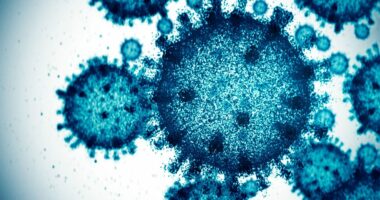Share this @internewscast.com
As we enter the colder months in Australia, Covid is making headlines again, this time due to the emergence of a new variant: NB.1.8.1.
Last week, the World Health Organization designated NB.1.8.1 as a “variant under monitoring”, owing to its growing global spread and some notable characteristics which could set it apart from earlier variants.
So what do you need to know about this new variant?
The current Covid situation
More than five years since Covid was initially declared a pandemic, we’re still experiencing regular waves of infections.
It is more difficult to track the occurrence of the virus nowadays, as fewer people are testing and reporting infections. But available data suggests in late May 2025 case numbers in Australia were ticking upwards.
Genomic sequencing has confirmed NB.1.8.1 is among the circulating strains in Australia, and generally increasing. Of cases sequenced up to 6 May across Australia, NB.1.8.1 ranged from less than 10% in South Australia to more than 40% in Victoria.
Wastewater surveillance in Western Australia has determined NB.1.8.1 is now the dominant variant in wastewater samples collected in Perth.
Internationally NB.1.8.1 is also growing. By late April 2025, it comprised roughly 10.7% of all submitted sequences – up from just 2.5% four weeks prior. While the absolute number of cases sequenced was still modest, this consistent upward trend has prompted closer monitoring by international public health agencies.
NB.1.8.1 has been spreading particularly in Asia – it was the dominant variant in Hong Kong and China at the end of April.
Where does this variant come from?
According to the WHO, NB.1.8.1 was first detected from samples collected in January 2025.
It is a sublineage of the Omicron variant, descending from the recombinant XDV lineage. “Recombinant” is where a new variant arises from the genetic mixing of two or more existing variants.
What does the research say?
Like its predecessors, NB.1.8.1 carries mutations in the spike protein. This is the protein on the surface of the virus that allows it to infect us – specifically via the ACE2 receptors, a “doorway” to our cells.
The mutations include T22N, F59S, G184S, A435S, V445H, and T478I. It’s early days for this variant, so we don’t have much data on what these changes mean yet. But a recent preprint (a study that has not yet been peer-reviewed) offers some clues about why NB.1.8.1 may be gathering traction.
Using lab-based models, researchers found NB.1.8.1 had the strongest binding affinity to the human ACE2 receptor of several variants tested – suggesting it may infect cells more efficiently than earlier strains.
The study also looked at how well antibodies from vaccinated or previously infected people could neutralise or “block” the variant. Results showed the neutralising response of antibodies was around 1.5 times lower to NB.1.8.1 compared with another recent variant, LP.8.1.1.
This means it’s possible a person infected with NB.1.8.1 may be more likely to pass the virus on to someone else, compared with earlier variants.
What are the symptoms?
The evidence so far suggests NB.1.8.1 may spread more easily and may partially sidestep immunity from prior infections or vaccination. These factors could explain its rise in sequencing data.
But importantly, the WHO has not yet observed any evidence it causes more severe disease compared with other variants.
Reports suggest symptoms of NB.1.8.1 should align closely with other Omicron subvariants.
Common symptoms include sore throat, fatigue, fever, mild cough, muscle aches and nasal congestion. Gastrointestinal symptoms may also occur in some cases.
How about the vaccine?
There’s potential for this variant to play a significant role in Australia’s winter respiratory season. Public health responses remain focused on close monitoring, continued genomic sequencing and promoting the uptake of updated Covid boosters.
Even if neutralising antibody levels are modestly reduced against NB.1.8.1, the WHO has noted current Covid vaccines should still protect against severe disease with this variant.
The most recent booster available in Australia and many other countries targets JN.1, from which NB.1.8.1 is descended. So it makes sense it should still offer good protection.
Ahead of winter and with a new variant on the scene, now may be a good time to consider another Covid booster if you’re eligible. For some people, particularly those who are medically vulnerable, Covid can still be a serious disease.
This article was originally published in the Conversation. Laro Herrero is an associate professor and research leader in virology and infectious disease at Griffith University
















